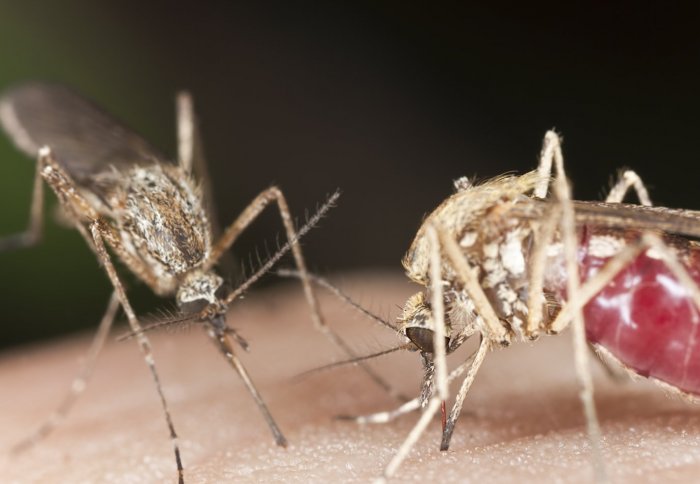Mosquitoes can't spot a spermless mate
by Simon Levey

Imperial scientists find female mosquitoes cannot tell the difference between fertile and 'spermless' males, they hope to use this eradicate malaria.
A female mosquito cannot tell if the male that she has mated with is fertile or 'spermless' and unable to fertilise her eggs, according to a new study from scientists at Imperial College London.
The research, published today in the journal Proceedings of the National Academy of Sciences, could help scientists in their mission to prevent the spread of malaria by interfering with the mosquitoes' ability to reproduce.
Malaria is a debilitating disease that affects more than 300 million people every year, and kills nearly 800,000 annually. In Africa, a child dies of malaria about every 45 seconds. Public health experts are working towards the eradication of malaria, but there is a recognised need for better and lower cost tools to achieve the eradication goal. The new study focuses on Anopheles gambiae, the species of mosquito primarily responsible for the transmission of malaria in Africa.
Today's results lend support to the idea that in the future it will be possible to control the size of the malaria-carrying mosquito population by introducing a genetic change that makes the males sterile. Such a method would rely on females mating unknowingly with such modified males and failing to produce any offspring. Although researchers are currently working on this solution, nothing has yet been trialled.
This study was carried out thanks to funding by the Medical Research Council in the UK and the European Community FP7 Collaborative Project grant called Malvecblok.
Lead author of the study, Dr Flaminia Catteruccia from the Department of Life Sciences at Imperial College London, said: "In the fight against malaria, many hope that the ability to genetically control the mosquito vector will one day be an key part of our armoury. In order for these currently theoretical control strategies to work, we need to make sure that the insects continue to mate as normal, unaware that we have interfered with their sexual mechanisms. This study strongly suggests that they cannot tell the difference between a fertile and a spermless mate."

Mosquitoes are responsible for the transmission of malaria
Co-author Professor Charles Godfray, from the University of Oxford Department of Zoology, said: "This is an exciting time with modern genetics providing a series of new ideas about how to control the major insect vectors of human disease, including the mosquito Anopheles gambiae - perhaps the single most dangerous insect species for mankind. A number of these techniques involve disrupting natural mating patterns and to get these to work a really good understanding of mosquito mating and reproduction is essential."
After mating for the first and only time in her life, the female mosquito undergoes certain physiological changes, then eats a blood meal and lays a batch of eggs. In the new experiments, the researchers observed that this behaviour was the same regardless of whether or not the mating encounter had produced fertilised eggs that could hatch into mosquito larvae.
The scientists were also surprised to discover that after mating with a spermless male, the female made no attempt to find a supplementary mate, effectively missing out on the opportunity to reproduce and pass on her genes. They expected to find that the species had evolved a mechanism so that females could avoid or bypass sterile males. For example, female fruit flies can mate with more than one male, helping to ensure their eggs are fertilised.

Researchers at Imperial study the malaria-carrying mosquito Anopheles gambiae
With the help of his colleages, Janis Thailayil, a PhD student at Imperial and another lead-author of the research, produced 100 spermless males for the study. He did this by injecting ordinary mosquito eggs with a protein that disrupted the development of their testes and prevented them from producing sperm in adulthood. Importantly, this did not interfere with any other sexual function or behaviours in either the female or the male.
They reached their conclusions after isolating mating mosquito couples in the laboratory and closely observing their behaviour and physiology during key stages of reproduction. They tested for the following characteristics in non-fertile mating couples: the males produced functioning seminal fluid, that brought about the same physiological changes in the females; the female laid the same number eggs in the absence of sperm; and the females abstained from sex following their first intercourse, as they do after mating with a fertile male.
Journal reference
Thailayil J, Magnusson K, Godfray H CJ, Crisant i A, and Catteruccia F, "Spermless males elicit large-scale female responses to mating in the malaria mosqui to Anopheles gambiae" http://www.pnas.org/cgi/doi/10.1073/pnas.1104738108
Article supporters
Article text (excluding photos or graphics) © Imperial College London.
Photos and graphics subject to third party copyright used with permission or © Imperial College London.
Reporter
Simon Levey
Communications Division